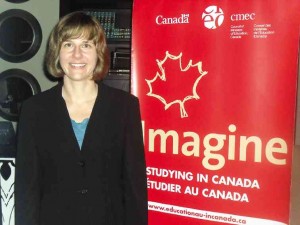Canada education fair set in Makati City
Today, October 22, from 3 p.m. to 9 p.m., the Embassy of Canada is holding an education fair at the Fairmont Hotel in Makati City.
The 2nd Study in Canada Fair aims to attract more Filipino students to pursue their secondary or tertiary education in Canada.
Admission is free.
“Holding an education fair twice this year not only shows Canadian schools’ growing focus on this region but also the increasing number of students attracted by Canada’s reputation for excellence in education,” said Karra-Lee Gerrits, senior trade commissioner of the Canadian Embassy.
The embassy held the first fair in January.
Article continues after this advertisementToday’s fair will be participated in by seven universities, eight colleges, three secondary schools and a language school.
Article continues after this advertisementThese are Emily Carr University Art + Design, University of Saskatchewan, Kwantlen Polytechnic University, Dalhousie University, Thompson Rivers University, King’s University College, Fairleigh Dickinson University, Niagara College, Centennial College, Seneca College, SAIT Polytechnic, College of the Rockies, Sheridan College, Fanshawe College, Loyalist College, The Great Lakes College of Toronto, Académie Ste Cécile International School and Stanstead College. The lone participating language school is Canadian Language Learning College.
Canadian colleges are “smaller schools” that offer two-year diplomas and technical courses. Students may continue their studies for another two years to earn a bachelor’s degree.
This year, five Canadian universities ranked among the Top 100 in the Times Higher Education World University Rankings and three made it to the Top 50 of the QS World University Rankings.
About 7.5 percent of students in Canada’s tertiary education institutions are international students. In 2012, the country welcomed more than 100,000 international students.
A foreigner can apply for a study permit by first choosing a school and applying for admission. He/she can apply to several institutions.
Once admitted, the applicant will get a letter of acceptance that he/she will need to secure a study permit.
Apart from the letter of acceptance, proofs of identity and sufficient funds have to be presented when applying for a study permit. The funds should cover tuition, living expenses and return fare.
Scholarships may also be provided by the school or by the government to foreign students. Application for these has to be done separately.
The study permit allows foreign students to work on campus. But they would have to get work permits if they want to accept jobs off campus.
Through the Off-Campus Work Permit Program, students can work part time during regular academic sessions (20 hours per week) and full time during scheduled breaks, such as winter and summer holidays and spring break. They may take any occupation and may also change employers.
To qualify for the program, an applicant must be a full-time student at a recognized educational institution and maintain a satisfactory academic standing. A list of participating schools may be accessed at www.cic.gc.ca/institutions.
After graduation, students will be encouraged to live and work in their host country by applying for permanent resident status.
For more information and updates, visit the embassy’s Facebook page at fb.com/CanEmbPH and follow @CanEmbPH on Twitter.
